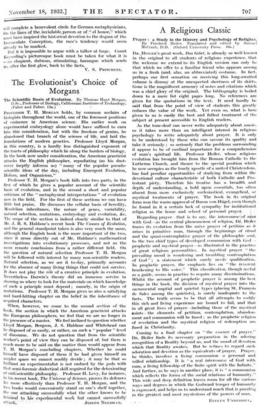The Evolutionist's Choice of Morgans
The Scientific Basis of Evolution. By Thomas Hunt Morgan, D.Sc., Professor of Biology, Californian Institute of Technology. (Faber and Faber. 15s.) .
PROFESSOR T. H. MORGAN holds, by common acclaim of biologists throughout the world, one of the foremost positions of eminence in American science. His earlier work on experimental embryology alone would have sufficed to earn him this consideration, but with the freedom of genius, he abandoned that branch of the science of life, and laid the foundations of modern genetics. Professor Lloyd Morgan, in this country, is a hardly less distinguished exponent of the tracts of philosophy which lie along the borders of biology. In the book now under consideration, the American geneticist attacks the English philosopher, repudiating (as his dust- cover ineptly informs us) "many of the popular pseudo- scientific ideas of the day, including Emergent Evolution, Holism, and Organicism."
Professor T. H. Morgan's book falls into two parts, in the first of which he gives a popular account of the scientific basis of evolution, and in the second a short and popular criticism of the "metaphysical interpretations" of evolution now in the field. For the first of these sections we can have little but praise. He discusses the cellular basis of heredity, Mendelian inheritance, the nature of genes, variability, natural selection, mutations, embryology and evolution, &c. The scope of the section is indeed closely similar to that of Mr. J. B. S. Haldane's recent book The Causes of Evolution, and the general standpoint taken is also very much the same, although the English book is the more important of the two, since it arose directly out of Mr. Haldane's mathematical investigations into evolutionary processes, and not as the more remote conclusions from a rather different field. On the question of natural selection Professor T. H. Morgan will be followed with interest by many non-scientific readers. Natural selection, as we see it to-day, primarily accounts for the absence of many living things that could not survive. It does not play the role of a creative principle in evolution. Nevertheless Darwin's theory did an immense service in showing us where to look for the materials on which knowledge of such a principle must depend ; namely, in the origin of mutations. Professor T. H. Morgan gives us also a satisfying and hard-hitting chapter on the belief in the inheritance of acquired characters.
When, however, we come to the second section of the book, the section in which the American geneticist attacks the European philosophers, we feel that we are no longer in the presence of a master. We feel inclined to question whether Lloyd Morgan, Bergson, J. S. Haldane and Whitehead can be disposed of so easily, or rather, on such a " popular " level of discourse. We do not question that from the scientific worker's point of view they can be disposed of, but there is much more to be said on the matter than would appear from T. II. Morgan's concluding chapters. Whether he could himself have disposed of them if he had given himself an ampler space we cannot readily decide ; it may be that so brilliant an experimentalist is not endued by the gods with that semi-forensic dialectical skill required for the detoxicating of anti-scientific philosophy. Professor II. Levy, for instance, in his recent book, The Universe of Science, pierces its defences far more effectively than Professor T. H. Morgan, and the two books would conveniently stand on one's shelf together, the one attacking successfully what the other knows to be inimical to his experimental work but cannot successfully
































































 Previous page
Previous page